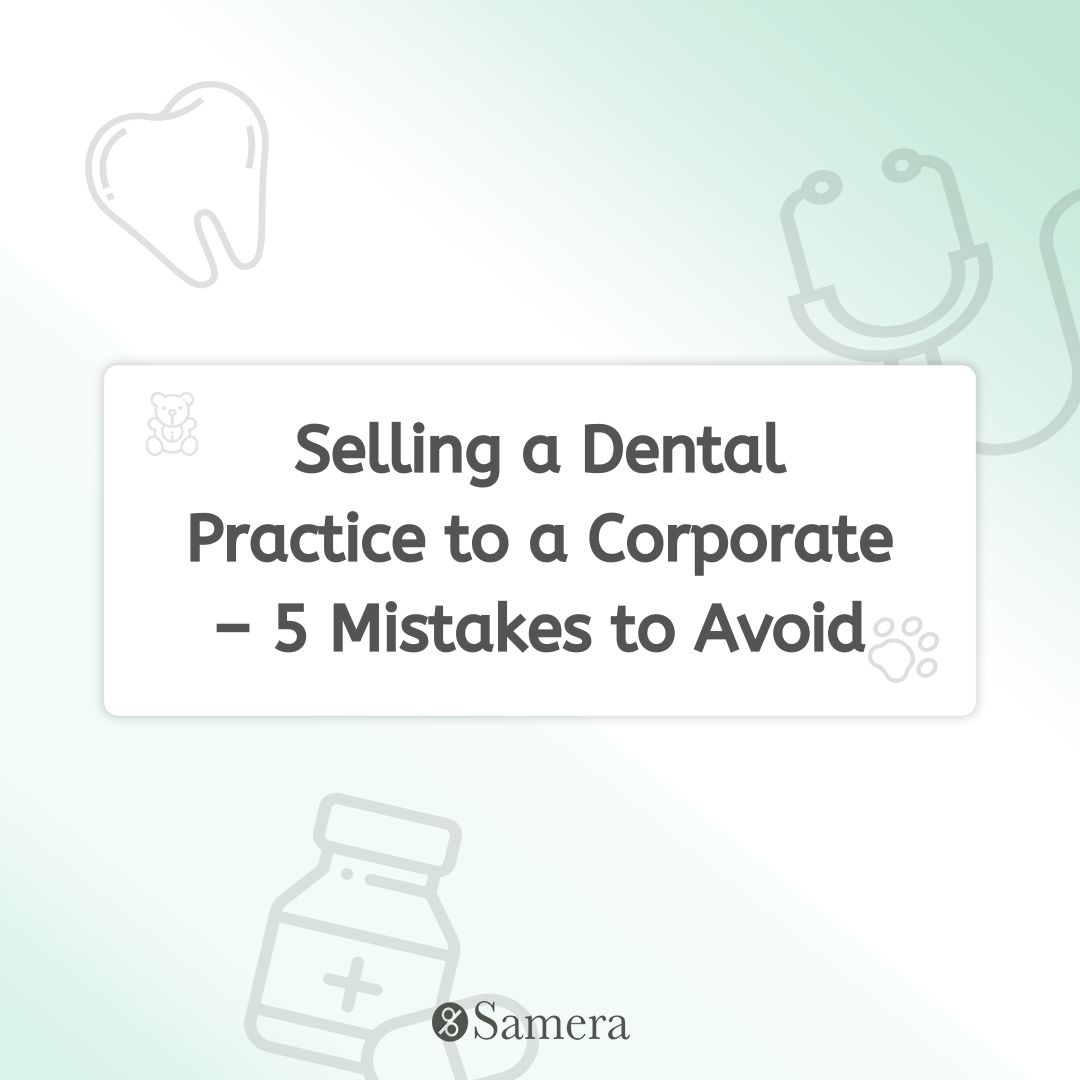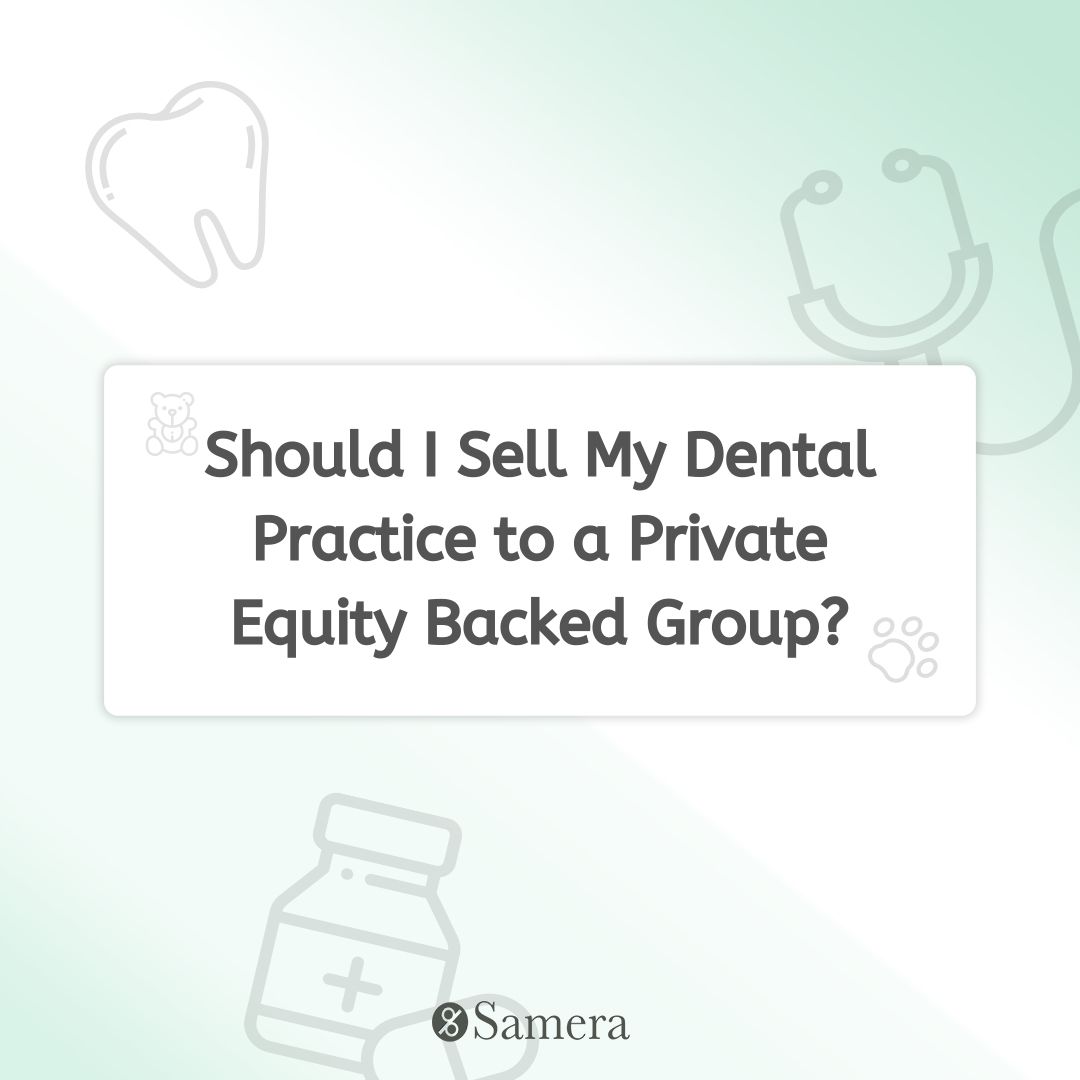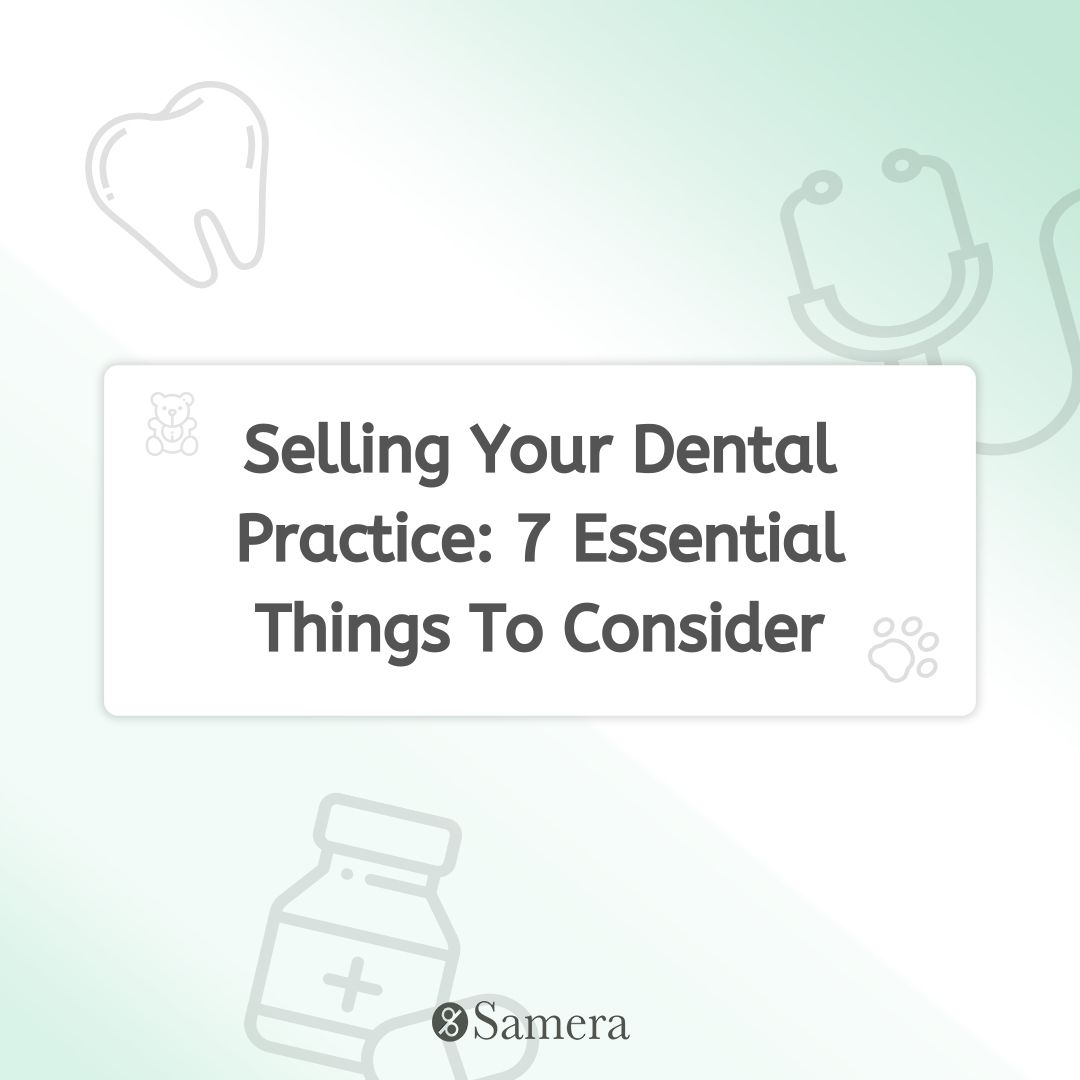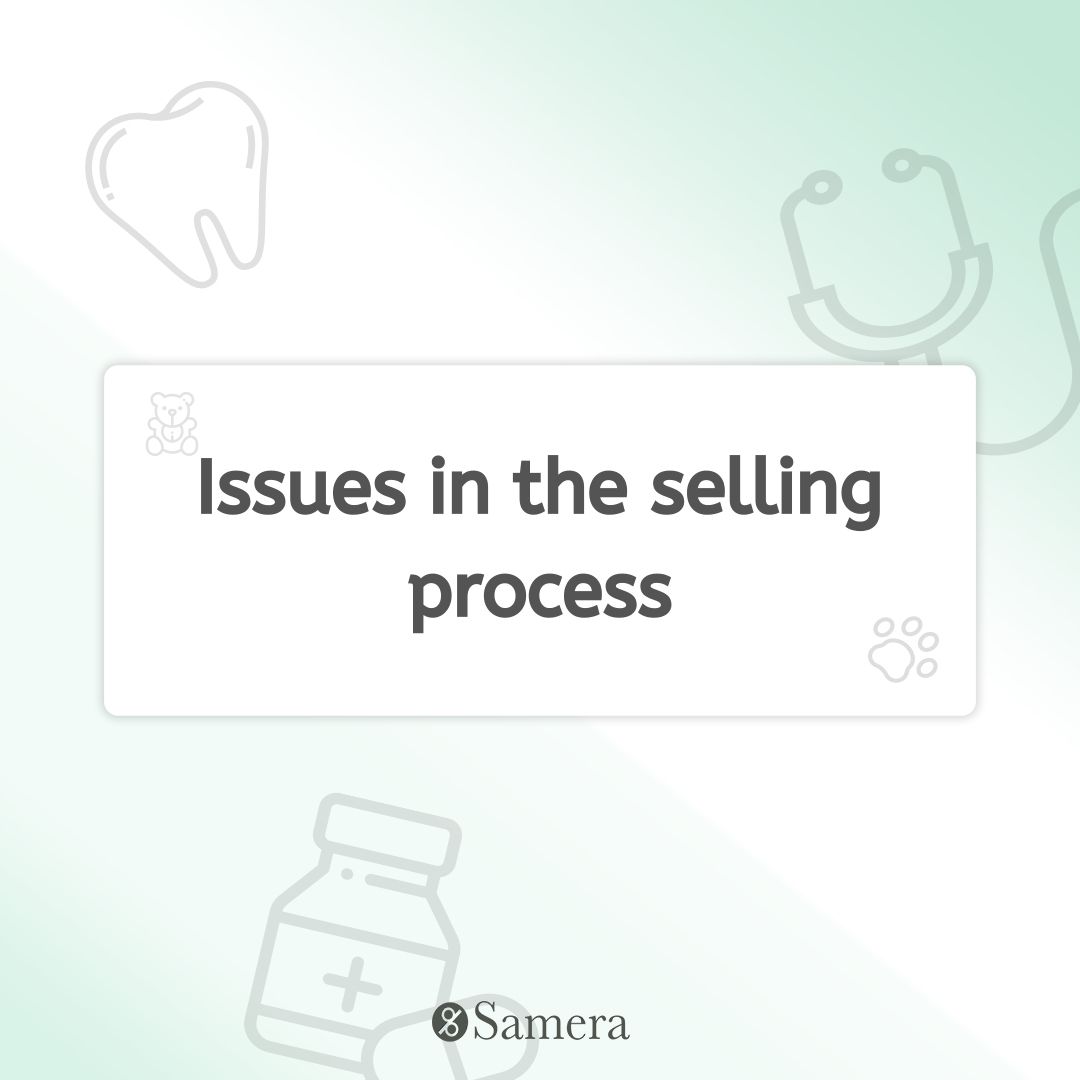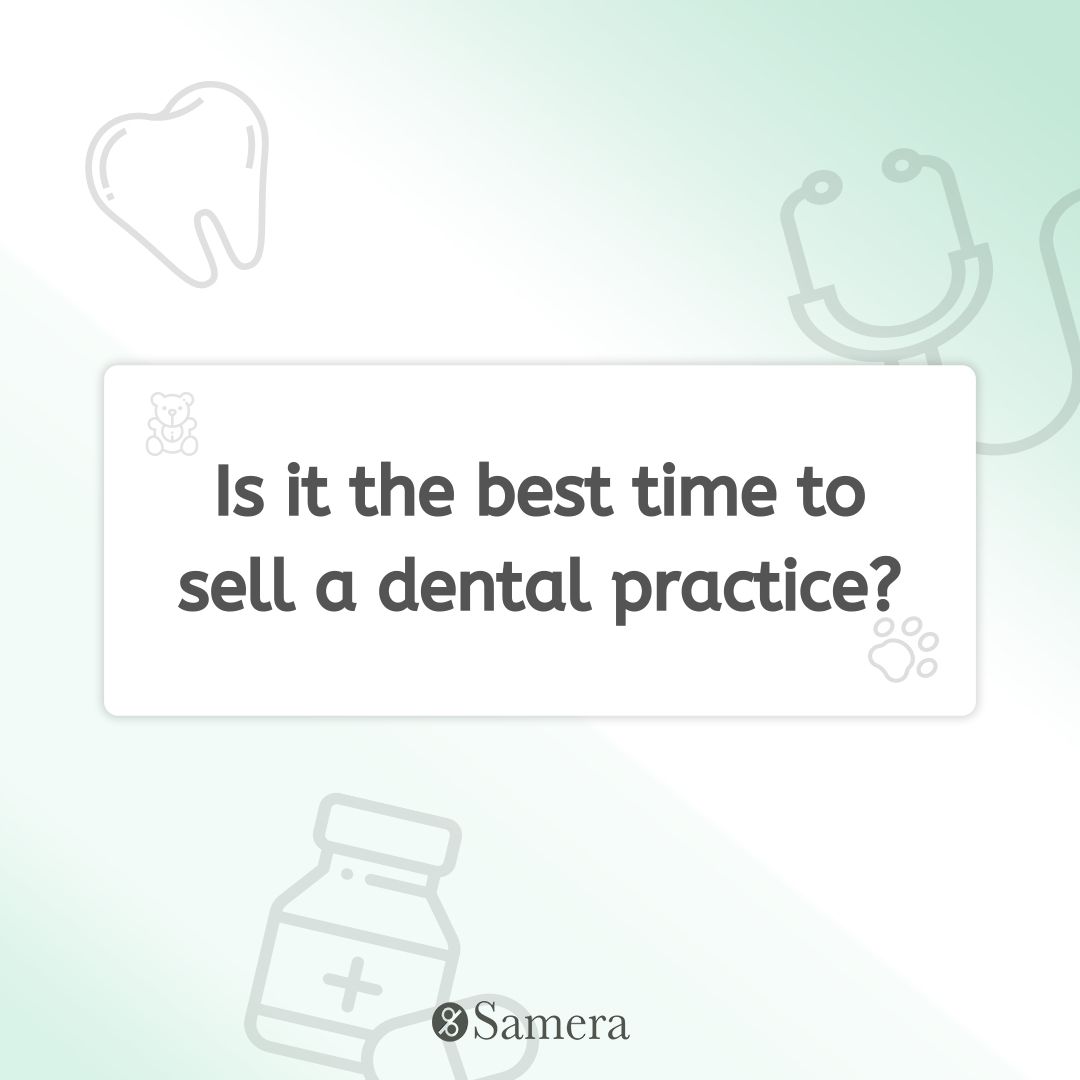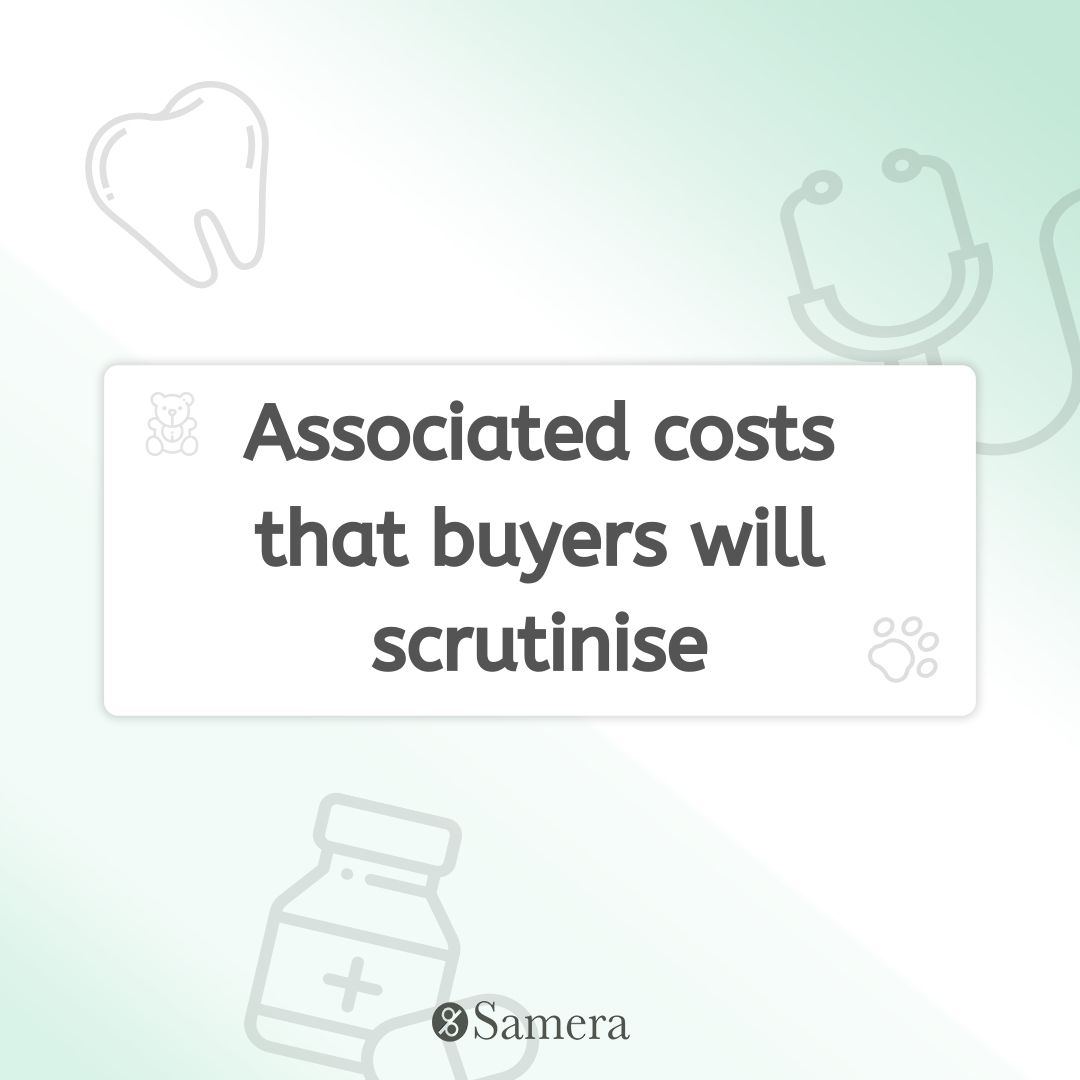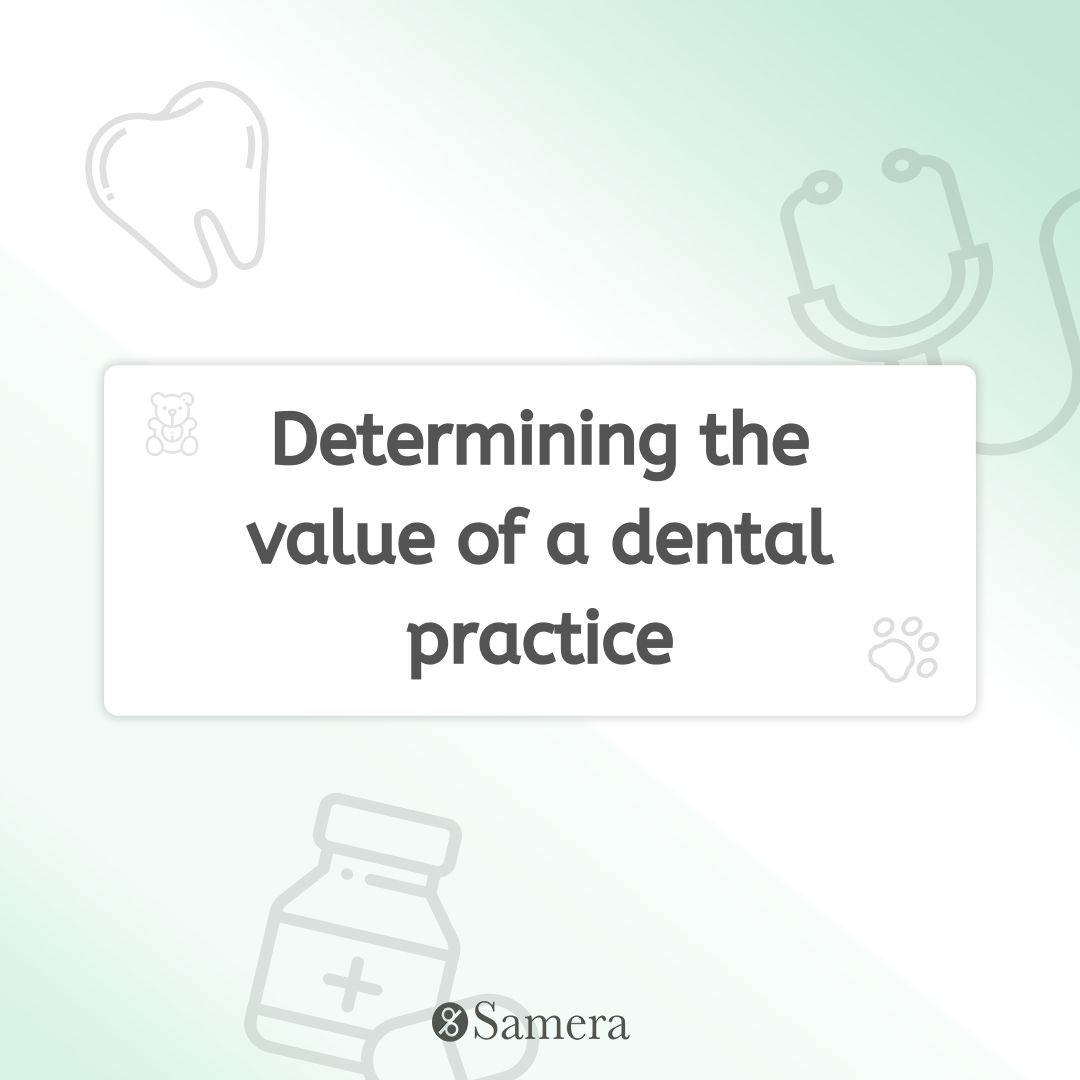Understanding the Value of Your Dental Practice: A Comprehensive Guide
Accurate valuation of a dental practice is vital for both sellers and buyers to get a fair price. Whether selling, planning retirement, or exploring expansion, understanding your dental business’s true value is crucial to making the right decision.
This guide explores the complex process of valuing a dental practice, highlighting key factors affecting its worth. One pivotal metric is EBITDA (Earnings Before Interest, Taxes, Depreciation, and Amortization).
The Importance of an Accurate Valuation
A dental practice’s value goes beyond financial figures, encompassing goodwill, patient relationships, community reputation, and overall operational efficiency. Accurate valuation considers tangible and intangible assets, providing a complete view of the practice’s true worth.
For sellers, accurate valuation ensures a fair market price, acknowledging years of hard work and investment. Buyers benefit by gaining a clear investment picture, aiding strategic decisions and future planning. Getting help from a specialist dental sales agent, such as Samera, is always a good idea.
The importance of Competitive Pricing
There is great demand for all types of dental practice in the UK, so it’s certainly possible to sell profitably. However, it’s important that a practice is not over-valued, restricting opportunities for sale. Buyers are often looking for a practice that they can buy with a view to add value and to re-sale at a profit in the future. This means that they do not want to overspend.
The sale price of a practice should always be based on transparent figures and evidence. The price has to be supported by the value that the practice represents.
It’s easy to adjust an EBITDA upwards, to try and demand a higher selling price, but this tends to simply lead to a bad reputation for the seller. I know I have ensured that several clients have embraced competitive pricing over the years, making completing a sale a lot simpler and quicker for them.
Click here to read our article on How to Sell Your Dental Practice in 9 Steps
Understanding EBITDA in Dental Practice Valuation
EBITDA, a key financial metric in dental practice valuation, represents earnings before interest, taxes, depreciation, and amortization. This metric offers a snapshot of operational performance, excluding non-operational expenses, providing a clear view of income generation from core operations.
Understanding EBITDA involves assessing profitability from a cash flow perspective, excluding non-cash expenses. In dental practice valuation, EBITDA serves as a benchmark, allowing buyers and sellers to negotiate a fair price reflecting the true earning potential.
In subsequent sections, we look at factors influencing dental practice valuation, various valuation methods, and EBITDA’s role in assessing overall worth.
Calculating EBITDA:
EBITDA is calculated by starting with a practice’s net income and adding back interest, taxes, depreciation, and amortization. The formula is represented as follows:
EBITDA=NetIncome+Interest+Taxes+Depreciation+Amortization
There is more detailed information available to read, but I am going to cover the basics here.
Significance of EBITDA in Dental Practice Valuation:
Operational Performance Assessment:
EBITDA offers a clear snapshot of a dental practice’s ability to generate income from its core operations. By excluding non-operational expenses, it provides insight into the practice’s day-to-day profitability.
Comparison to Industry Standards:
EBITDA serves as a benchmark for evaluating a dental practice’s financial health in comparison to industry standards. This comparative analysis aids in determining how well the practice is performing relative to other practices
Simplified Financial View:
As a standardized metric, EBITDA simplifies the financial picture of a dental practice. It allows buyers, sellers, and investors to focus on the practice’s core earning capacity without being influenced by non-cash items or one-time expenses.
Factors Considered in EBITDA Calculation:
Net Income:
The starting point for EBITDA calculation is the practice’s net income, which includes all revenues and expenses.
Interest:
EBITDA adds back interest expenses to provide a clearer view of the practice’s operational performance without the impact of financing costs.
Taxes:
Tax expenses are added back to eliminate their influence on the EBITDA calculation, allowing for a pre-tax assessment of earnings.
Depreciation and Amortization:
EBITDA adds back depreciation and amortization to the net income, as these are non-cash expenses that don’t directly affect the practice’s cash flow.
In the context of dental practice valuation, EBITDA is a valuable tool for negotiating a fair market price. Buyers can use it to assess the practice’s profitability, while sellers can highlight the true earning potential of their business. However, it’s essential to consider EBITDA in conjunction with other factors and valuation methods to arrive at a comprehensive understanding of a dental practice’s overall value.
Factors Influencing Dental Practice Value:
Historical Financial Performance (Last Three Years):
The past financial performance of a dental practice is a significant factor in valuation. Examining revenue trends, profit margins, and stability over the last three years provides insights into the practice’s historical success and financial health. Consistent growth and profitability enhance the perceived value of the practice.
Impact on Valuation:
Positive financial performance may result in a higher valuation, reflecting the practice’s track record of success. Conversely, declining performance may prompt a more conservative valuation, considering potential risks.
Potential for Growth and Expansion:
The potential for future growth and expansion is a critical factor in dental practice valuation. This includes the ability to attract new patients, introduce new services, or expand the existing patient base.
Impact on Valuation:
Practices with a demonstrated growth potential are often valued higher. Investors and buyers are willing to pay a premium for practices positioned for expansion, anticipating increased future earnings.
Type of NHS Contracts (PDS vs. GDS):
The nature of National Health Service (NHS) contracts, specifically Personal Dental Services (PDS) and General Dental Services (GDS), significantly influences valuation. PDS contracts often involve more flexibility in service provision and remuneration.
Impact on Valuation:
Practices with PDS contracts may be perceived as more adaptable and potentially less dependent on fee-for-service models. This flexibility can positively influence valuation, as it aligns with evolving trends in dental service delivery.
Location and Local Market Conditions:
The geographical location of a dental practice and the prevailing local market conditions play a crucial role in its value. Factors such as population density, demographic trends, and competition within the local market are considered.
Impact on Valuation:
Practices situated in high-demand areas with a growing population may command higher valuations. Conversely, practices facing intense competition or located in areas with declining populations may experience lower valuations.
In Summary:
- Positive Historical Financial Performance: Enhances valuation by demonstrating a track record of success and financial stability.
- Potential for Growth and Expansion: Practices positioned for future growth are often valued higher, reflecting anticipated increased earnings.
- Type of NHS Contracts: The flexibility associated with PDS contracts may positively impact valuation by aligning with evolving trends in dental service delivery.
- Location and Local Market Conditions: Geographical factors and local market dynamics significantly influence valuation, with practices in high-demand areas often commanding higher values.
Understanding these factors and their interplay is essential for both buyers and sellers in the dental practice market. A comprehensive evaluation, considering historical performance, growth potential, contract types, and local conditions, ensures a more accurate and informed assessment of a dental practice’s value.
Competitive Pricing and Market Demand in Dental Practice Sales:
Role of Competitive Pricing:
Competitive pricing plays a pivotal role in the successful sale of dental practices. Sellers must strategically set prices that align with market expectations, considering factors such as location, practice size, patient base, and overall financial performance.
Impact on Sale Success:
Well-priced dental practices attract more interest from potential buyers, facilitating a quicker and more successful sale. Overpricing can deter buyers, while under pricing may undervalue the practice.
Current Market Trends and Buyer Expectations in the UK Dental Industry:
In the UK dental industry, current trends and buyer expectations shape the dynamics of practice sales. Buyers often seek practices with modern facilities, established patient bases, and growth potential. Market trends include an increasing emphasis on preventive and cosmetic dentistry, as well as a preference for flexible NHS contract arrangements.
Impact on Sale Strategy:
Sellers who align their practices with these trends and buyer preferences are more likely to attract interested parties. Understanding the market landscape ensures that sellers can position their practices competitively and meet buyer expectations.
In Summary:
- Competitive Pricing: Crucial for attracting buyers and ensuring a successful sale, competitive pricing involves strategic alignment with market expectations.
- Market Trends and Buyer Expectations: Understanding current trends and buyer preferences in the UK dental industry is essential for positioning practices competitively and meeting buyer expectations.
- Case Studies or Examples: Learning from recent dental practice sales through case studies provides practical insights into successful strategies and their impact on sale outcomes.
By incorporating competitive pricing strategies, staying informed about market trends, and drawing lessons from case studies, sellers can enhance their chances of a successful and lucrative sale in the dynamic UK dental industry.
EBITDA Multiples and Sector Comparisons:
Upon calculating a figure of EBITDA, valuers apply a multiple to EBITDA to yield a value for the business.
Every sector multiple varies, which is really dependent on the demand for businesses in such sectors.
For instance, in the tech sector, we see very high multiples applied to EBITDA, whilst in Dentistry we see multiples ranging from 6-7x for single businesses and usually a higher multiple for larger dental groups.
Application of EBITDA Multiples:
EBITDA multiples are a common valuation method that involves applying a multiplier to a company’s Earnings Before Interest, Taxes, Depreciation, and Amortization. The resulting figure represents an estimate of the business’s overall value. This method is particularly relevant in industries where operational performance is a key indicator of value.
Comparison of EBITDA Multiples in Dentistry vs. Technology:
In the context of dentistry and technology sectors, EBITDA multiples can vary significantly due to the distinct characteristics of each industry. Technology companies often command higher multiples, reflecting their potential for rapid growth, innovation, and scalability. On the other hand, dental practices, being service-oriented and less scalable, may have comparatively lower multiples.
Rationale Behind Differences in EBITDA Multiples:
Growth Prospects:
Technology companies are often characterized by high growth potential, global reach, and scalability. Investors are willing to pay higher multiples for these businesses, anticipating substantial future earnings. In contrast, dental practices, being local and service-based, may have limited scalability, impacting their growth potential and, consequently, their multiples.
Industry Risk and Stability:
The technology sector is known for its innovation and dynamism, but it also comes with higher inherent risks. Investors may demand higher returns for navigating the uncertainties in technology, leading to elevated EBITDA multiples. Dental practices, as stable service providers with a more predictable patient base, may attract more conservative multiples.
Market Size and Competition:
The technology sector often operates in expansive global markets with significant revenue potential. Higher competition and broader market opportunities can contribute to increased EBITDA multiples. In contrast, the dental industry, while essential, may have more localized markets and lower revenue potential, influencing the multiples assigned to practices.
Operational Characteristics:
The nature of operations in each sector influences EBITDA multiples. Technology companies, especially software-based ones, may benefit from higher profit margins and lower operational costs once the product is developed. Dental practices, being service-oriented, may have higher operational costs and lower margins, affecting their multiples.
In Summary:
- EBITDA Multiples Application: EBITDA multiples are applied by multiplying a company’s EBITDA by a factor to estimate its overall value, commonly used in industries where operational performance is a key indicator.
- Comparison of Sectors: Technology sectors often command higher EBITDA multiples than dentistry due to factors such as growth prospects, industry risk, market size, competition, and operational characteristics.
- Rationale for Differences: Differences in EBITDA multiples arise from varying growth potential, risk levels, market dynamics, and operational characteristics inherent in different industries. Investors assess these factors when determining the appropriate multiples for valuation.
Did You Know?
- The intangible assets of a practice, such as its reputation, patient loyalty, and staff expertise, contribute to its goodwill value. Goodwill can account for a significant portion of the final sale price, especially for well-established practices with a strong brand. (Source: https://samera.co.uk/samera-calculators/)
- Dental practice values can be affected by the overall economic climate and dentistry industry trends. Increased demand for dental services due to population growth or changes in NHS funding can lead to higher valuations. (Source: https://www.ft-associates.com/practice-value-index-all/)
The Valuation Process: A Step-by-Step Guide by Samera
Initiation and Documentation Gathering:
The valuation process begins with an initial consultation where Samera gathers comprehensive financial documentation from the dental practice. This includes but is not limited to financial statements, tax returns, profit and loss statements, and balance sheets. Accurate and detailed financial data forms the foundation for a thorough valuation.
Introduction to the Valuation Team:
Clients are introduced to the valuation team at Samera, ensuring transparency and a clear understanding of the professionals involved in the process. The team typically includes financial analysts, valuation experts, and industry specialists.
Client Questionnaire:
Clients are provided with a detailed questionnaire designed to extract key information about the practice. This questionnaire covers various aspects such as practice history, patient demographics, staff composition, operational processes, and growth strategies. Client input is crucial for understanding the unique characteristics of the dental practice.
Initial Consultation:
An initial consultation is conducted to discuss the client’s goals, expectations, and any specific considerations related to the valuation. This meeting allows the valuation team to gain insights into the practice’s strengths, challenges, and future plans, further refining the valuation approach.
Financial Analysis and Benchmarking:
Samera conducts a thorough financial analysis, including benchmarking against industry standards. This step involves comparing the practice’s financial performance to key performance indicators in the dental industry, providing context for the valuation.
Application of Valuation Methods:
Various valuation methods, including EBITDA multiples, discounted cash flow (DCF), and comparable sales analysis, are applied based on the nature of the dental practice and industry standards. Each method contributes to a comprehensive assessment of the practice’s value.
In-Person Practice Assessment (if applicable):
Depending on the nature of the valuation, an in-person assessment of the practice may be conducted. This involves a physical examination of the facilities, equipment, and an evaluation of the overall operational environment.
Drafting the Valuation Report:
A detailed valuation report is drafted, presenting the findings, methodologies employed, and the determined value of the dental practice. This report serves as a comprehensive document for clients, providing transparency into the valuation process and its outcomes.
Consultation and Review:
Samera engages in a final consultation with the client to review the valuation report, address any questions or concerns, and provide additional insights. This interactive process ensures that clients fully understand the factors contributing to the determined value.
Delivery of the Valuation Report:
The finalized valuation report is delivered to the client. This report serves as a valuable tool for clients in negotiations, decision-making, and strategic planning related to their dental practice.
In Summary:
- Comprehensive Financial Documentation: The valuation process begins with the gathering of detailed financial documentation, forming the basis for a thorough assessment.
- Client Involvement through Questionnaires and Consultations: Client input is solicited through questionnaires and consultations, ensuring a personalized understanding of the dental practice’s unique characteristics.
- Application of Multiple Valuation Methods: Various valuation methods are applied, including financial analysis, benchmarking, in-person assessments, and the application of industry-standard methodologies.
- Transparent Reporting and Consultation: Samera emphasizes transparency by delivering a detailed valuation report and engaging in consultations to ensure clients are well-informed and confident in the valuation outcomes.
Additional Considerations in Valuation:
Adjustments to EBITDA:
During the valuation process, it’s essential to consider adjustments to EBITDA to present a more accurate picture of the dental practice’s sustainable earnings. This may involve accounting for one-time expenses, such as legal fees or restructuring costs, which may not be reflective of the practice’s ongoing operations. Additionally, adjustments for future savings or cost-cutting measures that are imminent can be factored in.
Impact on Valuation:
Making appropriate adjustments ensures that the valuation is based on the normalized, sustainable earnings potential of the dental practice. This allows both buyers and sellers to evaluate the business on its core operational performance without being unduly influenced by exceptional or non-recurring items.
Non-Operational Expenses:
Non-operational expenses, such as interest on loans or non-business-related travel expenses, should be carefully considered in the valuation. These costs don’t contribute to the day-to-day operations and profitability of the dental practice.
Impact on Valuation:
Adjusting for non-operational expenses provides a clearer view of the practice’s operational efficiency and profitability. By focusing on core operational earnings, the valuation becomes more accurate and aligned with the practice’s true value.
Owner-Specific Costs
Valuation should account for any owner-specific costs that may not be applicable under new ownership. This could include owner perks, discretionary spending, or personal expenses that are not essential for the practice’s operations.
Impact on Valuation:
Isolating owner-specific costs ensures that the valuation reflects the true financial health of the dental practice, independent of individual owner preferences or spending habits. This adjustment contributes to a more objective assessment of the business’s value.
Normalisation of Financial Statements:
Normalising financial statements involves adjusting historical financial data to eliminate irregularities, one-time events, or non-recurring expenses. This process creates a more standardized and representative financial picture for valuation purposes.
Impact on Valuation:
Normalizing financial statements allows for a more accurate assessment of the practice’s consistent earning capacity. It facilitates a better understanding of the practice’s financial performance over time, helping buyers and sellers make informed decisions.
In Summary:
- Adjustments to EBITDA: Consideration of adjustments to EBITDA, including one-time expenses and future savings, ensures a valuation based on sustainable earnings.
- Non-Operational Expenses: Accounting for non-operational expenses provides a more accurate representation of the dental practice’s operational efficiency and profitability.
- Owner-Specific Costs: Recognizing and adjusting for owner-specific costs ensures that the valuation is objective and reflects the business’s inherent value, independent of individual owner preferences.
- Normalization of Financial Statements: The normalization of financial statements contributes to a standardized and representative financial picture, aiding in the assessment of the practice’s consistent earning capacity.
Selling Your Dental Practice: Tips and Strategies
Best Practices for Preparing Your Practice for Sale
Organize Financial Documentation:
Ensure that your financial records, including profit and loss statements, tax returns, and other relevant documents, are well-organized and up-to-date. A clear financial history is crucial for potential buyers.
Enhance Operational Efficiency:
Streamline your practice’s operations to showcase efficiency. This may involve optimizing staff workflows, updating technology, and addressing any outstanding operational issues.
Address Regulatory Compliance:
Ensure that your practice adheres to all regulatory requirements. Compliance with healthcare regulations and standards is a key factor that can influence a buyer’s decision.
Build a Strong Patient Base:
Work on patient retention strategies and maintain a strong relationship with your existing patient base. A loyal and satisfied patient population can significantly enhance the appeal of your practice.
Presenting Your Practice Attractively to Potential Buyers
Highlight Growth Potential:
Emphasize the growth opportunities your practice offers. This may include the potential for expanding services, attracting new patients, or participating in emerging healthcare trends.
Showcase Technology and Infrastructure:
Showcase any modern technology, equipment, or infrastructure upgrades your practice has undergone. Highlighting a state-of-the-art facility can make your practice more appealing to buyers.
Demonstrate Community Engagement:
Showcase your practice’s involvement in the community. Positive community relationships and engagement can contribute to the overall attractiveness of the practice.
Transparently Communicate Financial Performance:
Clearly communicate your practice’s financial performance, emphasizing stable revenue streams and profitability. Transparency builds trust with potential buyers.
Role of Professional Valuation and Sales Agents
Professional Valuation:
Engage a professional valuation firm to assess the fair market value of your practice. A comprehensive valuation considers both tangible and intangible assets, providing an objective basis for pricing.
Benefits of Sales Agents:
Utilize the services of experienced sales agents who specialize in dental practice transactions. These professionals can navigate the complexities of the sales process, identify potential buyers, and negotiate on your behalf.
Market Expertise:
Leverage the market expertise of valuation and sales professionals to understand current industry trends, competitive landscapes, and buyer expectations. This insight can inform your sales strategy.
Negotiation and Closing Support:
Professional sales agents play a crucial role in negotiation and closing. Their experience can help secure a favourable deal and ensure a smooth transition for both parties.
Timing the Sale
Consider the timing of your sale strategically. Market conditions, the overall economy, and personal factors may influence the optimal time to sell. Being aware of these considerations can maximize the value of your practice.
In Summary:
- Preparation for Sale: Organize financial records, enhance operational efficiency, address compliance, and build a strong patient base.
- Attractive Presentation: Highlight growth potential, showcase technology and infrastructure, demonstrate community engagement, and transparently communicate financial performance.
- Professional Valuation and Sales Agents: Engage professional valuation services for accurate pricing and utilize experienced sales agents to navigate the sales process, identify potential buyers, and facilitate negotiations.
- Timing Considerations: Strategically time the sale, considering market conditions, the economy, and personal factors.
Leveraging Digital Tools for Enhanced Valuation
Digital Platforms for Efficient Financial Management:
Digital platforms and tools are reshaping the way financial management is approached within dental practices. From streamlined accounting systems to advanced analytics tools, the integration of digital solutions has become instrumental in enhancing efficiency, accuracy, and overall operational effectiveness. This transformation sets the stage for a more comprehensive and data-driven approach to dental practice valuation.
The Impact of Technology on the Valuation and Sale Process
Automated Financial Tracking:
Digital tools enable automated financial tracking, offering real-time insights into revenue, expenses, and key performance indicators. This not only ensures accuracy in financial reporting but also provides a dynamic foundation for a more precise valuation process.
Data Analytics for Informed Decision-Making:
Advanced data analytics tools empower dental practitioners to extract meaningful insights from extensive datasets. These insights aid in identifying trends, predicting future performance, and making informed decisions throughout the valuation and sales process, leading to more strategic outcomes.
Cloud-Based Financial Platforms:
Cloud-based financial platforms provide accessibility and collaboration, allowing stakeholders involved in the valuation process to securely access financial data from anywhere. This facilitates transparency and seamless communication, contributing to a more efficient workflow.
Enhanced Communication and Collaboration:
Digital communication tools and collaborative platforms simplify interactions between buyers, sellers, and valuation professionals. From financial report discussions to negotiations, these tools foster efficient communication, ensuring that all parties involved are on the same page.
Secure Data Management:
Cybersecurity measures embedded in digital financial management platforms ensure the secure handling of sensitive financial data. This is paramount in maintaining the confidentiality and integrity of information throughout the valuation and sales processes.
Virtual Due Diligence:
Technology enables virtual due diligence, allowing potential buyers to assess a dental practice remotely. Through digital documentation, virtual tours, and online meetings, the due diligence phase becomes more efficient, reducing the time and resources traditionally associated with this crucial process.
Facilitation of Online Transactions:
Digital tools facilitate online transactions and document signing, diminishing the reliance on physical paperwork. This not only accelerates the sales process but aligns with the modern, tech-driven expectations of both buyers and sellers.
In conclusion, the integration of digital tools into financial management practices is revolutionizing the valuation and sale processes for dental practices. This digital transformation not only improves efficiency but also enhances the accuracy and transparency of the entire transaction. As technology continues to advance, leveraging these tools becomes a strategic imperative for dental practitioners looking to optimize their valuation and sales outcomes.
How does Samera Value a Dental Practice?
If you want to value a dental practice, it’s important to understand that every dental practice is unique. They also have a range of values, from lower to higher values, which is determined by the financial accounts.
This is why we always ask for at least the last 3 years of the practice’s accounts and the most up-to-date management accounts.
To go alongside these documents, we created a comprehensive and time-effective questionnaire. We use this, as well as discussions with the business owners and managers, to determine the financial worth and potential of the practice.
We then create a valuation report, allowing us to understand the correct market value of the business. If you want to find out more about dental practice valuations, please get in touch.
Conclusion
In the dynamic landscape of the healthcare industry, staying informed, leveraging technology, and relying on professional expertise are essential elements for a successful and lucrative transition. Whether you are a seller looking to maximize the value of your practice or a buyer seeking a strategic investment, the collaboration with professionals ensures that you navigate the process with confidence and make well-informed decisions for the future.
Learn more: Related Articles
About the Author
Neha Jain is a skilled content writer with a rich background in business and financial knowledge. With a bachelor’s degree in English Literature and Psychology, Neha has honed her writing skills, furthering her expertise with the Content Writing Master Course (CWMC) at IIM SKILLS and a Content Marketing Certification from HubSpot Academy.
Working alongside our business development experts, Neha specialises in helping accountants, dentists and other healthcare professionals start, scale and sell their businesses.
Reviewed By:
Arun Mehra
Samera CEO
Arun, CEO of Samera, is an experienced accountant and dental practice owner. He specialises in accountancy, financial directorship, squat practices and practice management.
Dental Accounts & Tax Specialists
As dental practice owners ourselves, we know what makes a clinic tick. We have been working with dentists for over 20 years to help manage their accounts and tax.
Whether you’re a dental associate, run your own practice or own a dental group and are looking to save time, money and effort on your accounts and tax then we want to hear from you. Our digital platform takes the hassle and the paperwork out of accounts.
To find out more about how you can save time, money and effort on your accounts and tax when you automate your finances with Samera, book a free consultation with one of our accounting team today.
Dental Accounts & Tax: Further Information
Make sure you never miss any of our articles, webinars, videos or events by following us on Facebook, LinkedIn, YouTube and Instagram.


